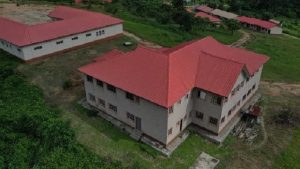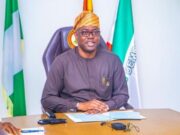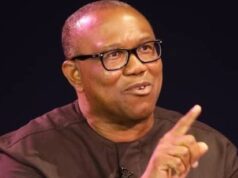PMParrot/Parrot Xtra’s correspondent, EMMANUEL ADENIRAN recently had an encounter with the Rector of Igbajo Polytechnic, Dr. Mrs. ‘Funmilayo Odejide, she spoke on the efforts of her administration towards the growth and expansion of the institution among many salient issues… Excerpts
Can our readers meet you?
I am Dr. Mrs. ‘Funmilayo Odejide, the Rector of Igbajo Polytechnic, Igbajo. This is my fourth year in office as the Rector.
What led to the establishment of Igbajo Polytechnic?
The institution came into being through the zeal of the leaders of this community to have higher education brought nearer to their people. Kiriji College, which was the initiative of the founding fathers of the town, was established to bring education nearer to Igbajo community. It had really helped many Igbajo and non-Igbajo indigenes who are now in places of authority and I think that was what encouraged their thinking of having a higher institution.
The thought was that if they had been able to try it with the secondary school and it worked out, then they could have a higher institution in the community. They believed that a polytechnic would help them better. I learnt Prince Adeoba Latilo conceived the idea of establishing Igbajo polytechnic. He brought the idea to Oba Olufemi Fasade, Akeran IV in 2004. Chief Adeoba Latilo was the Chairman of the Igbajo Development Association (IDA). The monarch then sold the idea to the whole community, which thereafter accepted and everyone is now sharing in the reality of the dream and that is how things worked out for the polytechnic to come to reality.
Can you relate with us the journey of the institution since it was established?
Igbajo Polytechnic was established in May 2005 but the idea of the polytechnic was first conceived in the year 2004. Although I came into the institution four years ago as the rector, the journey has been very rough but with determination, God has helped us to ensure that the school keeps advancing, we have had about three rectors before I came in. The forerunners of the institution, the committees that were appointed by the town were determined to make sure that the school stands. All the professionals in the field of Education, Engineering and Law and others were all incorporated to ensure that the institution runs its cause.
How is the school sourcing for funds to construct some of its facilities?
Yes, it is through communal efforts of the people, families and other good-hearted people that love the town. They levied themselves in order to contribute to the growth of the school and the resources were judiciously spent on the expansion of the polytechnic. The people and their friends sponsored most of the buildings on the polytechnic campus today. They brought in influential people to contribute to the growth of the school and one of such is the library complex built by a northerner.
The 500-seater auditorium was also built by a Lagosian who is an in law to an Igbajo indigene. They are people who love to see the reality of the vision and whatever thing the people of Igbajo community wanted to do, they are always determined.
How many departments and faculties do you have in the institution presently?
We have nine departments that we have divided into four faculties. We have faculty of Communication and Information Technology, faculty of Management Studies, faculty of Engineering Technology and the faculty of Applied Science. These four faculties make up the institution presently.
Are there any ongoing efforts to ensure that more courses are accredited by the National Board for Technical Education (NBTE)?
Yes, we are making very strong efforts towards achieving that. Looking at our Mass Communication Department, it was built by the community during the COVID-19 challenges last year. The community rose up to take care of the needs of the indigenes during the lockdown occasioned by COVID-19 pandemic and the left-over fund was used to cater for the needs of the polytechnic. We were thinking about having mass communication department in the institution before but through the effort of the community, we were able to establish it, which is now awaiting accreditation from NBTE.
Furthermore, we have the Office Technology (OTM) and there is need to float more courses. Presently, we have brought in Biochemistry, Health Information Management and Library Information Science and they at an advanced stage of being accredited by the NBTE.

Do you wish to speak precisely about your achievement and contribution since your assumption in office as the Rector?
To the glory of God, and the cooperation of my team, we have been able to put few things in place. By the time I came in here, our boundary was where we have the library, that library on the hill.
Looking at my dream for this institution, we decided that the management was going to have 500-seater hall, which we know that it cannot be built in a day.
As God would have it, we have indigenes from USA, they made their intention known that they wanted to build for us a cafeteria and a health center, which they have done.
The journey to building the administrative block started when some of the members of the council of the polytechnic visited the management and they asked us what project could be initiated from the left over funds meant for the COVID-19 pandemic, I responded and showed them the present location where the administrative block was eventually built. All the locations where we have buildings on the hill were initiated by my administration.
My former assistant, Engineer Bello and I did a survey of where the administrative building was to be sited before it was eventually constructed; we were able to locate the site where we now have the administrative block building. The day the representative of the Council and BOT came visiting, they said they wanted me to show them a place where the administrative block can be sited, we led them to the place where we had earlier surveyed and they were baffled about my quick response. Later I told them that each time I passed through the place, I have always had it in mind that our administrative building would be sited on the top of the hills.
After due consultations, the members of the BOT and the Council agreed with me that we should have the buildings on the top of the hill. Furthermore, during the construction of the mass communication complex, there was already a foundation laid by the Igbajo community of planks sellers who are residents in Ibadan. They started with the foundation and they could not complete the structure, later I advised the committee to seek permission from them if we can modify the design and build the complex on the existing foundation. What is funny about it is that each time I gave a location that I wanted, the people always show their readiness to cooperate and build.
Looking at the landmass of the school, can you tell us the distance of the school location to the North, South, East and West?
The landmass is about 50 hectares. Coming from the North through Ekiti State, you can relate it through Akure / Iloko / Ijebu Ijesa and from the South East and West; you can come in through Ikirun or Osogbo. From Osogbo to Ikirun, you can easily get to Igbajo because Igbajo to Ikirun is roughly about 30 minutes journey while it is about 60 minute journey to Osogbo.
Furthermore, from Ibadan to Igbajo, it is about 140km, which is approximately 2 hours 45 minutes drive; while from Akure to Igbajo is 107km approximately a total of 2 hours 19 minutes. From Ilorin to Igbajo is 109km while from Ado Ekiti to Igbajo is 95km; Benin City to Igbajo is 260km; Osogbo to Igbajo is 50km; Ikirun to Igbajo is 21km; Lokoja to Igbajo is 254km while from Ilesa to Igbajo is about 43km.
What efforts is your administration putting in place for the institution to become more popular and attractive to admission seekers?
All necessary organizations related to the education sector such as NBTE, JAMB, NYSC and others are where our name rings bell. We produce quality graduates who turn out to be our ambassadors. We are doing very well in terms of ranking by NBTE and we have ensured that we make enough adverts on radio especially on sports programmes that we are sure that youths are more familiar with.
We do also run special programmes such as ‘Igbajo Iloro’ on OSBC station in Osogbo sponsored by the institution’s management to enable people know more about the school. It is a radio programme where people are permitted to call in to ask pertinent questions.
Can you give us details of the composition of the Board of Trustees (BOT) and the Governing Council for the institution?
The BOT represents the entire Igbajo community as owner of the polytechnic. They are responsible for policy formulation and direction. They are also responsible for raising funds to complement the need of the polytechnic. It is a collection of indigenes of the town.
Presently, a Senior Advocate of Nigeria (SAN) in person of Chief Adegboyega Awomolo heads the BOT. We also have the Governing Council headed by Professor Olayiwola Oshunlade. The Governing Council is made up of professionals; seasoned administrators, academic and captains of industries. People in the BOT are having one building or the other erected in their name and in the honor of their friends who donated projects for the use of the institution.
The duty of the BOT is to see to the financial expenses of the institution while that of the Governing Council is to work with the polytechnic management ensure that the rules and regulations of the institution are kept by both the staff and the students. They also make inputs in on issues involving the school environment, employment, funds, students’ admissions requirements among other.
How often does the school conduct convocation and matriculation?
Matriculation is a necessity for every academic session; it is through that that students are admitted into the school. However, on the issue of the convocation, we stage this at three years’ interval.
What is the current population of the school?
The current population of the school is made up of more than 950 students. Some have just gone for the compulsory NYSC scheme and we are hoping to have more than 1000 students by the time we conclude admission processes knowing well that there are some courses still awaiting accreditation.
Even the 1000 students we are targeting is not enough judging by the available laboratories, studios, workshops, classrooms and lecturers we already have. We can take good care of much more. In addition, the students live in the town…off campus.
How affordable is the institution’s fees?
The school fees are very affordable comparatively. When you look at what others are charging, ours is very affordable. Without any corrupt tendencies, it is very cheap and affordable as a private institution.
Can you give us your closing remarks?
Well, my remark is that I am encouraged by the spirit of unison of the Igbajo people. Most especially, the way they have been coming together to make sure they affect the lives of the youths in Nigeria positively is most commendable.
This institution is not for Igbajo alone. We have students from different places, even easterners and northerners are students of our institution.
In addition, the school has been able to reduce the challenges of employment in our society through its establishment. We have many qualified lecturers that have been employed to work here. I have also observed that our non-teaching staffs are improving themselves academically. I do tell my people here that Igbajo is ‘small Nigeria’.
Igbajos are determined people and are doing what they should do. If other communities can emulate the people of Igbajo, the government will suffer less in the hands of the people. The attacks on the government would be less if we have other towns and communities doing the same thing Igbajos did by establishing their own polytechnic and using it to groom people up in entrepreneurial education and vocational and technical trainings. Things will not be too difficult for us in Nigeria.
The country of China that people are hailing today does not have something big as we have in Nigeria. They do their own things in a small way and their children are learning it passionately.
If others can think of this kind of thing, and specializing in some areas that can touch the economy of the nation, we shall have better Nigeria. The Igbajo people are caring; I must tell you the truth. One is encouraged to work here because there is a progressive push – one for everyone in this school.
What specific message do you have for Nigerians especially on the current state of education and the way forward?
I would like to say that our educational system should be more purposeful. Not because of what people are doing in Britain and America, what we intend to achieve should be more paramount in our hearts as a nation. Where are the people we want to train and for what purposes? I can remember during the Olusegun Obasanjo’s era when NCE certificate was the order of the day, President Obasanjo at that time introduced the UBEC/ETF scheme, which actually helped the education sector to thrive. The scheme helped to train and equip a lot of teachers and students to perform better and I enjoyed the scheme at Adeyemi College of Education in Ondo when I was still a student.








































































